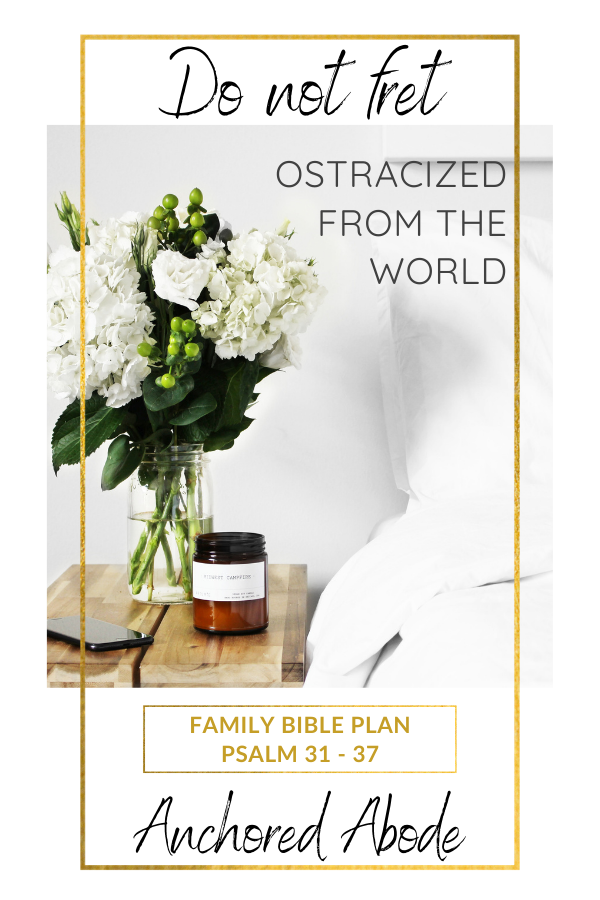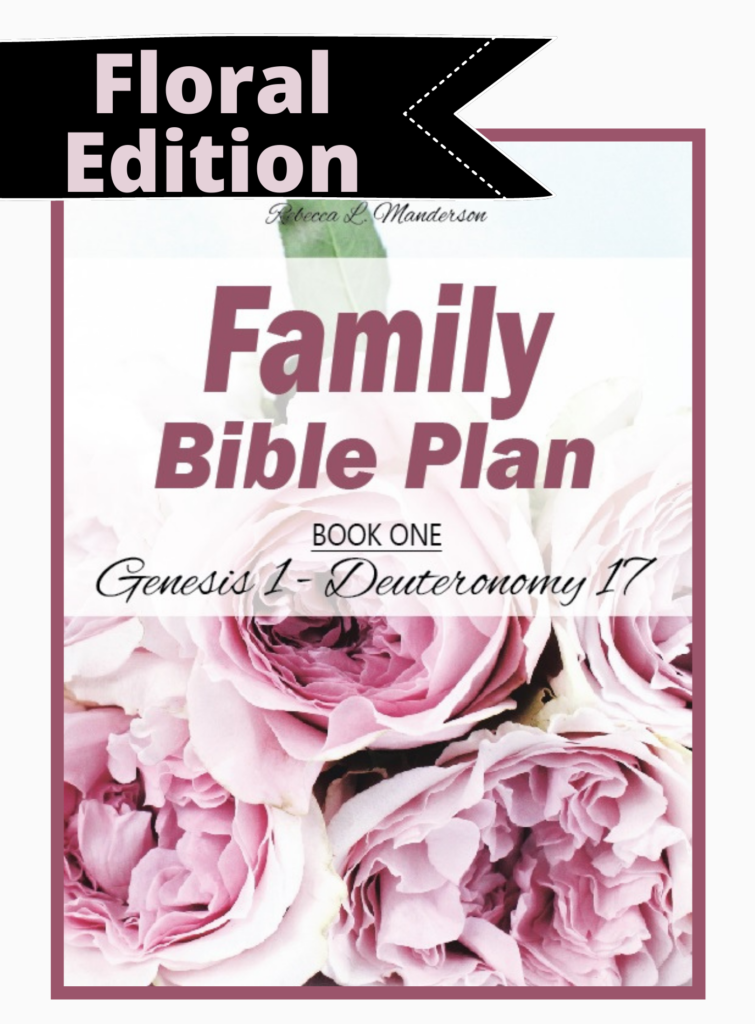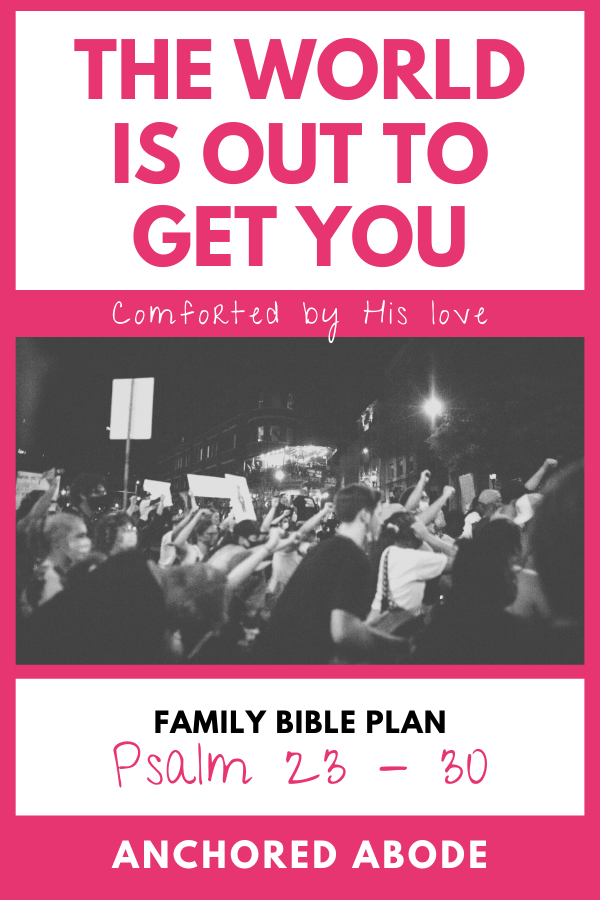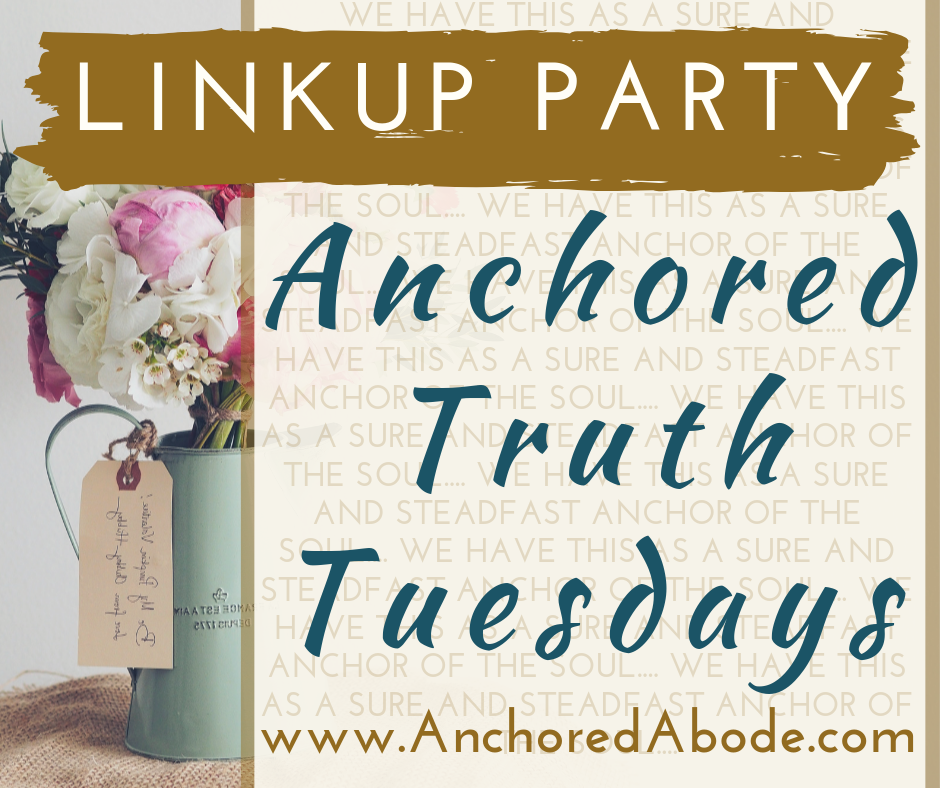Do not Fret | Ostracized from the world (Psalm 31-37)
Be kind, you never know the battle someone else is facing. This is a very common phrase that often encourages an extra smile and a softer heart. Our own emotions come into and out of play throughout the day as we encounter different experiences and people. Similarly, David experienced a whole host of emotional, spiritual, and physical battles. In Psalm 37, “Do not fret” helps define the Psalm’s theme because it was followed up with eternal comfort.
The reality is that evil acts and wicked people will cross our path. For this reason, a whole host of emotions will arise up during these encounters.
It’s never too late to start….
Download your first two weeks free by signing up below (or buy Book One of the Family Bible Plan)!
[email-download-link namefield=”YES” id=”5″]
Emotional beings…
Surprisingly, we can forget that God created us with emotions. We are made in His likeness, and He also expresses emotion.
There is a practice that occurs in churches to encourage emotions; the same can be said of most movies. Have you been in church listening to prayer or the pastor say something quietly when subtle music fills the background? Music affects people and can often bring about an emotional response. Depending on who you ask, this can be a good practice to address your thoughts, fears, feelings, etc.
As an aside, it can also be manipulated. A worship pastor once told me he was taught the 3-cord trick, because apparently there is a series of 3 cords that, when played, trigger feelings.
Do not fret…
Markedly, David aptly addresses his raw emotions.
Do not fret because of evildoers, nor be envious of the workers of iniquity.
Psalm 37:1, NKJV
Rest in the Lord, and wait patiently for Him; do not fret because of him who prospers in his way, because of the man who brings wicked schemes to pass. Cease from anger, and forsake wrath; do not fret—it only causes harm.
Psalm 37:7-8, NKJV
Woah, this phrase is used 3 times in the first 8 verses. On the whole, repetitive speak in the Bible should send a little alarm to pay attention to this!
Defining it…
Bringing it back, let’s look at the Greek for the phrase: do not fret.
‘Do not’ is represented by one word in the Hebraic language: ‘al‘. It was an ‘adverb of negation, denying however, not objectively as a fact, but subjectively as a wish, expressing therefore a deprecation or prohibition.’
‘Fret’ comes from the Hebrew word ‘charah’. This word took on an entirely different meaning than expected: ‘to burn or be kindled with anger’. Here it it tied to the Hebrew word ‘hithpael’ meaning: ‘imperfect, heat oneself in vexation.’
He was agitated, burning, zealous, jealous, displeased, earnest, incensed. These were on-fire emotions ready to set the place ablaze. Yet, he was calming and encouraging a calm reaction in light of the bigger picture. ‘Subjectively as a wish… a prohibition.” Do not fret. In other words, you need not get worked up, the Lord hears you and will vindicate you.
Eternal Mindset…
The Bible never fails to show David tie his emotions to an eternal mindset. This is no accident. Again, think through David’s life and all of the trials he faced. His life was in danger MANY times, yet, he teaches us to always turn back to God as our rock and redeemer in both our life on earth and for the next life.
David penned an enormous gift for us to read. He lived through it, and we have the opportunity to learn from him. He had a way of presenting everything in this life with a contrasting yet corelating view that tied directly into eternity. Even the title of this Psalm seems earthly but ultimately points to eternity: ‘The Heritage of the Righteous and the Calamity of the Wicked.’
Broken pottery…
Jump back a few Psalms to read his example of a time he was broken down yet again. He is asking God for help while he is in distress, then shares how troubled he was.
Because of all my adversaries I have become a reproach, especially to my neighbors, and an object of dread to my acquaintances; those who see me in the street flee from me. I have been forgotten like one who is dead; I have become like a broken vessel.
Psalm 31:11-12

A broken vessel, or pottery, was a common occurrence. Since it was useless as a vessel, it was often ‘set aside or thrown away, being abandoned to utter destruction and no more cared for.’
That is how David described himself among his neighbors and acquaintances. This man had been broken.
Ostracized by men…
Consider this, some 500 years after David died, the Athenians have a recorded usage for broken pottery. Every year they had a meeting to choose who (if any) should be ostracized from their community… typically this was reserved for politicians or leaders who had gained too much power.
The people would write (typically they were illiterate and had a scribe do this for them) the name of the person they wanted ostracized on a broken piece of pottery (derived from the word ostraka) as though it was their ballot. Broken pottery was common and useless. During this time, however, they used it as a tool to expel a member from within their society. No charge had to be presented, and no defense was given. Whomever they chose, if enough votes were collected, they had to leave for 10 years.
David considers himself as useless and unwanted as broken pottery, he was ostracized. In effect, he could very well have been the posterchild for the practice of ostracism.
Inheriting the Promised Land…
Psalm 37 is considered a wisdom Psalm.
“This [P]salm’s dominant theme is related to the contrast between the wicked and the righteous reflected in Psalm 36. The central issue addressed is: Who will “inherit the land” (vv. 9,11,22,29), i.e., live on to enjoy the blessings of the Lord in the promised land? Will the wicked, who plot (v. 12), scheme (vv. 7,32), default on debts (v. 21), use raw power to gain advantage (v. 14) and seem thereby to flourish (vv. 7,16,35)? Or will the righteous, who trust in the Lord (vv. 3,5,7,34) and are humble (v. 121), blameless (vv. 18,37), generous (vv. 21,26), upright (v. 37) and peaceable (v. 37), and from whose mouth is heard the moral wisdom that reflects meditation on God’s law (vv. 30-31)?
NIV Study Bible
Find the eternal perspective…
The Old Testament points us to the New Testament, Jesus, and eternal life. The promised land referenced here was only partially in the Israelite’s possession. Remember, King David’s role was to establish the territory, in part so Solomon could build the permanent temple during a time of peace. The nation of Israel was either in the muck of battles or settling into their new territory. David talks as though it has not yet been inherited and that the heritage of the righteous is the promised land.
As an illustration, David is portrayed as a prefigure of Jesus on earth. David is confirming that the hearts of the people will lead to a continuing heritage in the place prepared by God for His people. Similarly, Jesus’ life on earth was confronting people’s hearts in relation to an inheritance in the place God has prepared for His people in eternity.
We can see a future foretelling that goes deeper than his current situation. The promised land also represents that God has prepared a place for us in eternal life. Who will inherit it?
Ostracized from the world…
David was ostracized from the world. He battled much more than many of us, yet it can be easy to forget the reason for the rawness of his emotions because we fail to recognize the reality of his situations.
David knew the righteous would one day be vindicated and often practiced releasing that to God. Do not fret, the wicked will have true justice one day. While it may seem frustrating, we would do well to take a page from David’s book. Their just due will be served.
We may be ostracized from the world, but good riddance! We have a promised land waiting for us in eternity with God! The wicked will be ostracized from the greatest gift of all!
Worth it!
Last Week
Anchored Truth Tuesdays
~It is appreciated but not required that you follow my social media accounts
[DISPLAY_ULTIMATE_SOCIAL_ICONS]
~A new Anchored Abode podcast (iTunes) has been started, and I would love for subscribers and positive reviews (SoundCloud)
~I do ask that you use the Anchored Truth Tuesdays logo above on your site somewhere or on the post itself; if you click on the picture above a new window will open with html instructions
~ Family friendly posts only (I reserve the right to delete any that are deemed inappropriate); with a direct link to a specific blog post
~It is appreciated if you spread the blogging love to those around you in the Anchored community by visiting their sites, following them, or liking/sharing posts
~We have a Pinterest group board, Anchored Truth Tuesdays, where all who link up are welcome to also upload their content–you’ll just need to like Anchored Abode first, and then request to join
~By submitting a link, you are agreeing to be added to our email list as well as allowing the use of pictures/content as featured posts on our social media accounts




May we find grace to take.a long view as we consider what we value and what is worth fighting for.
That “do not fret”? It’s an everyday battle for me, but one I’m fighting.